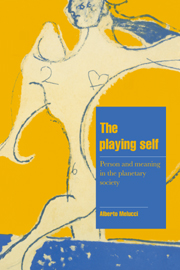Book contents
- Frontmatter
- Contents
- Introduction
- 1 The challenge of the everyday
- 2 Needs, identity, normality
- 3 Metamorphosis of the multiple self
- 4 The inner planet
- 5 Body as limit, body as message
- 6 On taking care
- 7 The abyss of difference
- 8 Amorous senses
- 9 Inhabiting the earth
- 10 A eulogy to wonder
- Epilogue
- Bibliographical note
- References
- Index
1 - The challenge of the everyday
Published online by Cambridge University Press: 04 October 2009
- Frontmatter
- Contents
- Introduction
- 1 The challenge of the everyday
- 2 Needs, identity, normality
- 3 Metamorphosis of the multiple self
- 4 The inner planet
- 5 Body as limit, body as message
- 6 On taking care
- 7 The abyss of difference
- 8 Amorous senses
- 9 Inhabiting the earth
- 10 A eulogy to wonder
- Epilogue
- Bibliographical note
- References
- Index
Summary
Metaphors of time
We all have a spontaneous idea of what we mean when we talk about ‘time’; the notion is immediate and intuitive. Yet when we try to define it, we have to resort to imagery, or perhaps to scientific language, which seems to serve as a kind of a lingua franca of today. Even when we understand immediately what we are talking about, we find it extremely hard to pin down what the experience of time actually means.
It is no coincidence that human beings have been puzzled about time since the dawn of history, and that they have conceived it as something so important and profound, something so constitutive of their experience, as to earn the status of the sacred. In more ancient cultures, reference to time always conjured up a divine image – often a river god or another aquatic deity which, in the image of the flow, reflects the appearance and disappearance of things and encloses the cosmos in the circular movement depicted by another traditional symbol, the serpent biting its tail. Fluid and enfolding, the experience of time is characterized by a sense of thickness and a density that our definitions seldom provide and which, perhaps for this reason, cultures have sought to convey through the means of metaphor and myth.
This perhaps explains why the experience of time is so diversified.
Information
- Type
- Chapter
- Information
- The Playing SelfPerson and Meaning in the Planetary Society, pp. 7 - 23Publisher: Cambridge University PressPrint publication year: 1996
